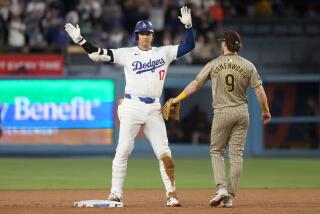McGwire Represented Baseball as Power Ball
- Share via
Baseball’s iron man and the best pure hitter of his generation each retired in October to great acclaim. Baltimore’s Cal Ripken, who surpassed the monumental record for consecutive games played, was honored before his last appearance in opposing ball parks throughout 2001. Tony Gwynn, an eight-time National League batting champion and a .338 career hitter, received standing ovations wherever his San Diego team performed in the waning months of the season.
They both were saluted at the All-Star Game in Seattle and commissioner Bud Selig made a point of attending tributes at Qualcomm Stadium and Camden Yards on the final weekend of the campaign, passing up the opportunity to witness Barry Bonds’ unprecedented 71st, 72nd and 73rd home runs. “We’ve been better,” Selig said, “because they came along and played major-league baseball.”
And yet neither the relentless infielder from the East Coast nor the smooth and sunny outfielder from the West Coast defined the period in which he played. As much as they contributed to the sport’s popularity and became personifications of their respective cities, they took a backseat in the national consciousness to a contemporary figure who made his private exit from baseball last month. Public adulation made Mark McGwire cringe even as he came to symbolize the game as played in the last decade of the 20th century and the first two seasons of the 21st.
He was a contradiction in terms, a man who stood out for his size and prodigious drives but preferred to blend in with the teams for which he played, the Oakland Athletics and St. Louis Cardinals. It wasn’t always possible, of course, particularly in 1998 when he obliterated a home run record that had endured for 37 years and emerged from a two-man race with Sammy Sosa as baseball’s single-season champion. Although his record of 70 was exceeded by Bonds this season, it was the 225 homers struck by McGwire over a four-year period and the distances they traveled that stretched the configurations of the sport.
With the assistance of officials who authorized further expansion, more intimate ball parks, tightly wound baseballs and armor plating for batters, the mammoth first baseman terrorized unseasoned, intimidated and frequently overmatched pitchers. It was the start of a trend that resulted in a home run barrage that dropped Roger Maris (61 in 1961) and Babe Ruth (60 in 1927) to seventh and eighth places, respectively, on the list of baseball’s single-season sluggers.
Even for those who believed more offense increased the popularity of the sport, the assault was a mixed blessing, especially after McGwire admitted taking androstenedione during his breakthrough 1998 season.
The supplement, banned in most sports but permitted in baseball, was one of many that players have used in conjunction with extensive weight training to build muscle mass. Big Mac was the most visible example of what the combination could do.
Bonds acknowledged a debt to McGwire as he approached his 70th homer in the final week of the season. “Mark set the table,” Bonds said. “It’s his record and he needs to be recognized.”
Even after Bonds accounted for No. 73 in the season finale, there was no assurance it would last more than a year in the current environment. Shawon Dunston, the veteran from Brooklyn who has played with Sosa, McGwire and Bonds in the course of his career, speculated that Sosa might surpass McGwire’s record in 2002. “That would be awesome,” he said.
Awesome, yes, but almost predictable. “There are smaller parks now,” noted Larry Dierker, the Houston manager whose team’s late-season collapse and playoff failure cost him his job. “Players are using smaller bats for better bat speed. They’re not embarrassed to strike out a lot. The only thing that can stop them is a wave of good pitchers.”
As the results of the playoffs and World Series made clear, and not for the first time, good pitching does dominate good hitting. But the baseball played in the postseason bears less and less resemblance to that practiced during the regular season, where sluggers gorge themselves against thin pitching staffs, where the statistics are bloated and the game itself is skewed.
The good teams still know how to advance runners without benefit of a base hit, still understand the value of defense and the necessity of putting a competent pitcher on the mound each day. The rest look a lot like the Texas Rangers, who may have the next home run king in Alex Rodriguez but finished last in the AL West, 43 games behind the Seattle Mariners.
None of that is Mark McGwire’s fault. But, even in retirement, he remains the poster boy for baseball excess.
More to Read
Go beyond the scoreboard
Get the latest on L.A.'s teams in the daily Sports Report newsletter.
You may occasionally receive promotional content from the Los Angeles Times.










